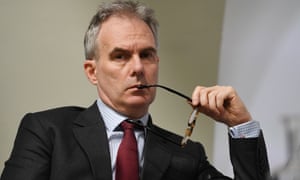UK consumers likely to hold off spending on socialising, senior Bank official predicts
Concerns about mutant strains of Covid-19 could depress some types of consumer spending after lockdown eases, one of the Bank of England’s most senior officials has said.
Ben Broadbent, deputy governor for monetary policy, said lingering fears about coronavirus variants could deter people from making some spending decisions later this year after restrictions have been relaxed.
He told CNBC that sectors of the economy where people interacted socially could face weaker levels of demand for goods and services. “One hopes that we now have pretty good data on infection rates including identification of any new variants, but those fears could well linger,” he said. “I can certainly see why people might be fearful to spend on particular things, things that expose them to the risk of infection. And as you say, some of those fears may linger even after vaccination.”
Despite his note of caution, Broadbent said he anticipated a strong recovery in consumer spending this summer as Covid restrictions were eased, helping the UK recover economically from the pandemic.

Highlighting a boom in activity after the relaxation of lockdown last summer, he said: “Overall spending does come back pretty strongly when you remove these caps, at least initially. So we have certainly allowed for some lingering concerns. But that doesn’t mean that consumption overall won’t recover quite strongly, at least initially, once you start loosening the restrictions. That was exactly the experience we had last year.”
Hospitality, leisure and international travel, where social interaction is important, have suffered most in the pandemic. However, Broadbent said consumers had reallocated spending to areas where the risks of infection were lower, helping to offset the damage to the economy at large. Online sales, as well as spending on DIY, home furnishings, bicycles and hobbies have surged during the past year.
Threadneedle Street is forecasting a 4.25% plunge in GDP in the first quarter, followed by a resurgence of economic activity as vaccinations allow the economy to return to brisk growth. The Bank said on Thursday that it expected high street lenders to prepare for potential negative rates by July, in case there was a fresh downturn and it needed to cut the official rate below zero to stimulate the economy.
Officials said the balance of risks in the economy, mainly from new variants of Covid overwhelming the vaccination programme, meant it needed to keep rates low at 0.1%.
Broadbent said tight border restrictions imposed by the government could drag down economic activity in the coming weeks. Ministers are preparing to quarantine arrivals to the UK from high-risk countries in hotels from 15 February, because of concerns about mutant strains of Covid-19.
The Bank has not forecast the implications of specific border controls, but Broadbent said: “My instinct would be that if you close borders, that would be negative for both the demand and the supply side of the economy.”
Source: Read Full Article

